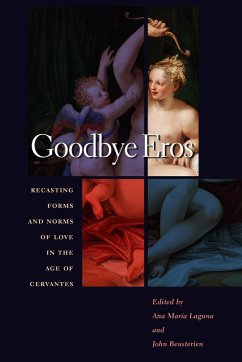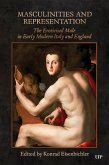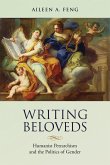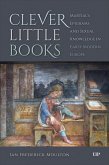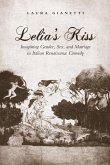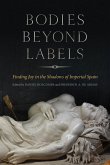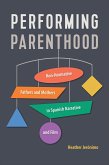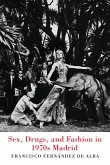Goodbye Eros
Recasting Forms and Norms of Love in the Age of Cervantes
Herausgeber: Laguna, Ana; Beusterien, John
Goodbye Eros
Recasting Forms and Norms of Love in the Age of Cervantes
Herausgeber: Laguna, Ana; Beusterien, John
- Gebundenes Buch
- Merkliste
- Auf die Merkliste
- Bewerten Bewerten
- Teilen
- Produkt teilen
- Produkterinnerung
- Produkterinnerung
A surfeit of tropes about love exhausted Spanish literature in the age of Cervantes. This book provides a pioneering look at the rich array of ways in which Spanish Golden Age authors responded by crafting a new literary aesthetic.
Andere Kunden interessierten sich auch für
![Masculinities and Representation Masculinities and Representation]() Masculinities and Representation87,99 €
Masculinities and Representation87,99 €![Writing Beloveds Writing Beloveds]() Aileen FengWriting Beloveds94,99 €
Aileen FengWriting Beloveds94,99 €![Clever Little Books Clever Little Books]() Ian Frederick MoultonClever Little Books69,99 €
Ian Frederick MoultonClever Little Books69,99 €![Lelia's Kiss Lelia's Kiss]() Laura GiannettiLelia's Kiss102,99 €
Laura GiannettiLelia's Kiss102,99 €![Bodies Beyond Labels Bodies Beyond Labels]() Bodies Beyond Labels107,99 €
Bodies Beyond Labels107,99 €![Performing Parenthood Performing Parenthood]() Heather JerónimoPerforming Parenthood90,99 €
Heather JerónimoPerforming Parenthood90,99 €![Sex, Drugs, and Fashion in 1970s Madrid Sex, Drugs, and Fashion in 1970s Madrid]() Francisco Fernandez De AlbaSex, Drugs, and Fashion in 1970s Madrid65,99 €
Francisco Fernandez De AlbaSex, Drugs, and Fashion in 1970s Madrid65,99 €-
-
-
A surfeit of tropes about love exhausted Spanish literature in the age of Cervantes. This book provides a pioneering look at the rich array of ways in which Spanish Golden Age authors responded by crafting a new literary aesthetic.
Hinweis: Dieser Artikel kann nur an eine deutsche Lieferadresse ausgeliefert werden.
Hinweis: Dieser Artikel kann nur an eine deutsche Lieferadresse ausgeliefert werden.
Produktdetails
- Produktdetails
- Verlag: University of Toronto Press
- Seitenzahl: 350
- Erscheinungstermin: 9. April 2020
- Englisch
- Abmessung: 229mm x 152mm x 21mm
- Gewicht: 590g
- ISBN-13: 9781487504212
- ISBN-10: 1487504217
- Artikelnr.: 55887212
- Herstellerkennzeichnung
- Produktsicherheitsverantwortliche/r
- Europaallee 1
- 36244 Bad Hersfeld
- gpsr@libri.de
- Verlag: University of Toronto Press
- Seitenzahl: 350
- Erscheinungstermin: 9. April 2020
- Englisch
- Abmessung: 229mm x 152mm x 21mm
- Gewicht: 590g
- ISBN-13: 9781487504212
- ISBN-10: 1487504217
- Artikelnr.: 55887212
- Herstellerkennzeichnung
- Produktsicherheitsverantwortliche/r
- Europaallee 1
- 36244 Bad Hersfeld
- gpsr@libri.de
Edited by Ana Maria Laguna and John Beusterien
Introduction: Eros in the Age of Cervantes
Ana Maria Laguna, Rutgers University and John Beusterien, Texas Tech
University
Part I. Amorous Optics: Reframing Perception, Gender Subjectivity, and
Genre Convention
1. Egocentricity versus Persuasion: Eros, Logos, and Pathos in Cervantes’s
Marcela and Grisóstomo Episode
Joan Cammarata, Manhattan College and Ana Maria Laguna, Rutgers University
2. The Deceived Gaze: Visual Fantasy, Art, and Feminine Adultery in
Cervantes’s Reading of Ariosto
Mercedes Alcalá Galán, University of Wisconsin-Madison
Part II. Reasoning the Unreasonable: Towards a Rationale of Love
3. El Greco and Cervantes’s Euclidean Theologies
Eric Clifford Graf, Francisco Marroquin University
4. Love and the Laws of Literature: The Ethics and Poetics of Affect in
Cervantes’s "The Little Gypsy Girl"
Eli Cohen, Swarthmore College
5. Eros and Ethos in the Political and Religious Logos of The Trials of
Persiles and Sigismunda: The Anomic Character in Cervantes
Jesús Maestro, University of Oviedo
Part III: Kissing between the Lines: Blurring Sexual and Racial Norms
6. Sexy Beasts: Women and their Lapdogs in Baroque Satirical Verse
Adrienne Martin, University of California, Santa Cruz
7. Sexual Deviance and Morisco Marginality in Cervantes’s The Trials of
Persiles and Sigismunda
Christina Lee, Princeton University
8. The Black Madonna Icon: Race, Rape, and the Virgin of Montserrat in The
Confession with the Devil by Francisco de Torre y Sevil
John Beusterien, Texas Tech University
Part IV: Recasting Erotic and Heroic Molds
9. For Love of the White Sea: The Curious Identity of Uludj Ali
Diana de Armas Wilson, University of Denver
10. Writing a Tragic Image: Eros and Eris in Lope de Vega’s Jerusalem
Conquered
Jason McCloskey, Bucknell University
11. The Un-Romantic Approach to Don Quixote: Cervantine Love in the
Spanish, Post-War Age
Ana Maria Laguna, Rutgers University
Notes
List of Contributors
Ana Maria Laguna, Rutgers University and John Beusterien, Texas Tech
University
Part I. Amorous Optics: Reframing Perception, Gender Subjectivity, and
Genre Convention
1. Egocentricity versus Persuasion: Eros, Logos, and Pathos in Cervantes’s
Marcela and Grisóstomo Episode
Joan Cammarata, Manhattan College and Ana Maria Laguna, Rutgers University
2. The Deceived Gaze: Visual Fantasy, Art, and Feminine Adultery in
Cervantes’s Reading of Ariosto
Mercedes Alcalá Galán, University of Wisconsin-Madison
Part II. Reasoning the Unreasonable: Towards a Rationale of Love
3. El Greco and Cervantes’s Euclidean Theologies
Eric Clifford Graf, Francisco Marroquin University
4. Love and the Laws of Literature: The Ethics and Poetics of Affect in
Cervantes’s "The Little Gypsy Girl"
Eli Cohen, Swarthmore College
5. Eros and Ethos in the Political and Religious Logos of The Trials of
Persiles and Sigismunda: The Anomic Character in Cervantes
Jesús Maestro, University of Oviedo
Part III: Kissing between the Lines: Blurring Sexual and Racial Norms
6. Sexy Beasts: Women and their Lapdogs in Baroque Satirical Verse
Adrienne Martin, University of California, Santa Cruz
7. Sexual Deviance and Morisco Marginality in Cervantes’s The Trials of
Persiles and Sigismunda
Christina Lee, Princeton University
8. The Black Madonna Icon: Race, Rape, and the Virgin of Montserrat in The
Confession with the Devil by Francisco de Torre y Sevil
John Beusterien, Texas Tech University
Part IV: Recasting Erotic and Heroic Molds
9. For Love of the White Sea: The Curious Identity of Uludj Ali
Diana de Armas Wilson, University of Denver
10. Writing a Tragic Image: Eros and Eris in Lope de Vega’s Jerusalem
Conquered
Jason McCloskey, Bucknell University
11. The Un-Romantic Approach to Don Quixote: Cervantine Love in the
Spanish, Post-War Age
Ana Maria Laguna, Rutgers University
Notes
List of Contributors
Introduction: Eros in the Age of Cervantes
Ana Maria Laguna, Rutgers University and John Beusterien, Texas Tech
University
Part I. Amorous Optics: Reframing Perception, Gender Subjectivity, and
Genre Convention
1. Egocentricity versus Persuasion: Eros, Logos, and Pathos in Cervantes’s
Marcela and Grisóstomo Episode
Joan Cammarata, Manhattan College and Ana Maria Laguna, Rutgers University
2. The Deceived Gaze: Visual Fantasy, Art, and Feminine Adultery in
Cervantes’s Reading of Ariosto
Mercedes Alcalá Galán, University of Wisconsin-Madison
Part II. Reasoning the Unreasonable: Towards a Rationale of Love
3. El Greco and Cervantes’s Euclidean Theologies
Eric Clifford Graf, Francisco Marroquin University
4. Love and the Laws of Literature: The Ethics and Poetics of Affect in
Cervantes’s "The Little Gypsy Girl"
Eli Cohen, Swarthmore College
5. Eros and Ethos in the Political and Religious Logos of The Trials of
Persiles and Sigismunda: The Anomic Character in Cervantes
Jesús Maestro, University of Oviedo
Part III: Kissing between the Lines: Blurring Sexual and Racial Norms
6. Sexy Beasts: Women and their Lapdogs in Baroque Satirical Verse
Adrienne Martin, University of California, Santa Cruz
7. Sexual Deviance and Morisco Marginality in Cervantes’s The Trials of
Persiles and Sigismunda
Christina Lee, Princeton University
8. The Black Madonna Icon: Race, Rape, and the Virgin of Montserrat in The
Confession with the Devil by Francisco de Torre y Sevil
John Beusterien, Texas Tech University
Part IV: Recasting Erotic and Heroic Molds
9. For Love of the White Sea: The Curious Identity of Uludj Ali
Diana de Armas Wilson, University of Denver
10. Writing a Tragic Image: Eros and Eris in Lope de Vega’s Jerusalem
Conquered
Jason McCloskey, Bucknell University
11. The Un-Romantic Approach to Don Quixote: Cervantine Love in the
Spanish, Post-War Age
Ana Maria Laguna, Rutgers University
Notes
List of Contributors
Ana Maria Laguna, Rutgers University and John Beusterien, Texas Tech
University
Part I. Amorous Optics: Reframing Perception, Gender Subjectivity, and
Genre Convention
1. Egocentricity versus Persuasion: Eros, Logos, and Pathos in Cervantes’s
Marcela and Grisóstomo Episode
Joan Cammarata, Manhattan College and Ana Maria Laguna, Rutgers University
2. The Deceived Gaze: Visual Fantasy, Art, and Feminine Adultery in
Cervantes’s Reading of Ariosto
Mercedes Alcalá Galán, University of Wisconsin-Madison
Part II. Reasoning the Unreasonable: Towards a Rationale of Love
3. El Greco and Cervantes’s Euclidean Theologies
Eric Clifford Graf, Francisco Marroquin University
4. Love and the Laws of Literature: The Ethics and Poetics of Affect in
Cervantes’s "The Little Gypsy Girl"
Eli Cohen, Swarthmore College
5. Eros and Ethos in the Political and Religious Logos of The Trials of
Persiles and Sigismunda: The Anomic Character in Cervantes
Jesús Maestro, University of Oviedo
Part III: Kissing between the Lines: Blurring Sexual and Racial Norms
6. Sexy Beasts: Women and their Lapdogs in Baroque Satirical Verse
Adrienne Martin, University of California, Santa Cruz
7. Sexual Deviance and Morisco Marginality in Cervantes’s The Trials of
Persiles and Sigismunda
Christina Lee, Princeton University
8. The Black Madonna Icon: Race, Rape, and the Virgin of Montserrat in The
Confession with the Devil by Francisco de Torre y Sevil
John Beusterien, Texas Tech University
Part IV: Recasting Erotic and Heroic Molds
9. For Love of the White Sea: The Curious Identity of Uludj Ali
Diana de Armas Wilson, University of Denver
10. Writing a Tragic Image: Eros and Eris in Lope de Vega’s Jerusalem
Conquered
Jason McCloskey, Bucknell University
11. The Un-Romantic Approach to Don Quixote: Cervantine Love in the
Spanish, Post-War Age
Ana Maria Laguna, Rutgers University
Notes
List of Contributors

